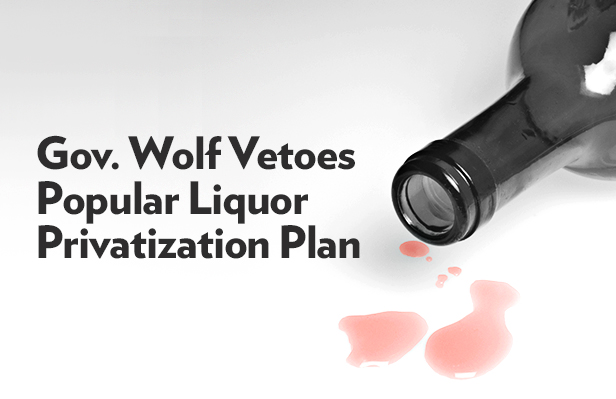Media

New Wolf Offer, Same Bad Policy
Yesterday, 28 days after receiving a budget compromise proposal from legislative Republicans, Gov. Wolf rejected that offer and issued his own plan—hiring a private contractor to manage the government liquor system and slightly modifying his earlier pension proposal.
While Governor Wolf’s proposals are significant, and new to the current budget debate, they represent bad public policy.
Liquor:
- Wolf’s plan to hire a private manager to run the liquor system replaces a government-run monopoly with a government monopoly run by a private company. In contrast to Wolf’s comments that he doesn’t want to “give this away to a crony,” that is precisely what this plan would do.
- Consumers will not see better selection, prices, or service.
- This plan doesn’t provide consumers new choices or true competition
- This plan retains the one-size-fits all model that Pennsylvania consumers have come to hate—and drive to other states to avoid.
- Wolf’s proposal doesn’t end the conflict of interest of government controlling and promoting the sale of alcohol.
- It doesn’t change the fact that we having a single entity (or one person) choosing what products can and cannot be sold in Pennsylvania—which has resulted in rampant corruption and bribery.
- The idea that wine in groceries and restaurants are “to be negotiated” means he isn’t offering the most basic reform consumers want to see.
Consumers will only see better selection, prices, and service when the government gets out of the wholesale business and allows competition, not monopoly, in wholesale and retail wine and spirits sales.
Pensions:
- Wolf’s stacked hybrid pension plan doesn’t offer meaningful reform. It is subject to the same political manipulations that plague the current pension system—increasing benefits and delaying contributions, kicking the can down the road.
- The salary threshold could be adjusted at any point (Wolf proposed putting salary above $75,000 in a defined-contribution account, vs. his proposal of $100,000 a month ago) cutting into any “savings.”
- While several states have created hybrid pension plans (part defined contribution, part defined benefit), no one has implemented a stacked hybrid.
- Wolf’s $3 billion pension obligation (PO) bond proposal should be a nonstarter.
- PO bonds have been historic failures—almost every city or state that has used pension obligation bonds have seen larger deficits after the bond issues. This includes in Philadelphia and Pittsburgh—where Mayor Peduto spoke out against Wolf’s bond proposal.
- Wolf’s projected “savings” in reduced pension contributions don't include the interest payments on those bonds.
- Ratings agencies have cautioned that pension bonds would result in bond rating downgrades.
- Anti-spiking and revenue neutral option 4 reforms are good, commonsense reforms that protect taxpayers. Wolf should be applauded for supporting these reforms, and almost no one would disagree these are necessary changes.
- The risk sharing for current employees is a good reform—but the $2 billion “savings” only occurs if the pension funds earn 6.5% instead of the projection 7.5%, an investment return that would create tens of billions in additional costs versus current projections.
- Reducing Wall Street Investment fees is another good idea—SERS and PSERS have exorbitant costs—but Wolf has indicated he can do this administratively, with no legislation needed. This doesn’t need to be part of a “deal.”
- Oddly, the government unions who oppose converting to a defined contribution plan claim 401K plans have higher investment costs—despite the fact that large 401k plans have lower fees than many defined contribution plans, and rates only a fraction of what SERS and PSERS are paying now.